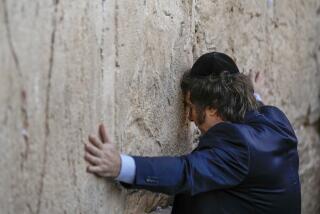President of Argentina Apologizes for Nation’s Role as Haven for Nazis
- Share via
WASHINGTON — Bearing a message of contrition for Argentina’s dark past, President Fernando de la Rua issued a formal apology Tuesday for his country’s role in harboring Nazi war criminals after World War II.
De la Rua, an erstwhile opposition figure elected president last October, said a formal apology was necessary to help Argentina come to grips with its anti-Semitic past. The apology follows release of a report earlier this year by a government commission showing that successive Argentine governments helped give refuge to 180 Nazi war criminals.
“Today, before you and before the world, I want to express my most sincere pain and to ask forgiveness that this happened, that Nazis were hidden among us,” De la Rua told reporters. “Clearly, our solidarity is with the victims of the Holocaust and with all victims of doctrines of racial hatred.”
De la Rua repeated his message in meetings with Jewish leaders and in remarks at the U.S. Holocaust Memorial Museum here, where he laid a wreath and lighted a candle in the Hall of Remembrance, which is dedicated to the victims of the Nazi era.
De la Rua, who is making his first visit to Washington since taking office, shared a working lunch with President Clinton. The two presidents discussed strengthening democracy, recent presidential elections in Peru, drug trafficking in Colombia, telecommunications, and trade and economic issues.
During De la Rua’s visit, which ends this afternoon, officials from the two nations will sign four agreements. The pacts will permit criminal extradition, strengthen anti-corruption efforts in the South American nation, enhance environmental preservation in Argentina’s national parks and expand existing scientific cooperation involving satellites.
For several years, Argentina has been coming to terms with its role as a refuge for Nazi criminals and their ideas. De la Rua’s predecessor, Carlos Menem, began the public exploration in 1997 when he created a government commission and ordered it to conduct a full investigation of the country’s role in harboring Nazis.
But De la Rua has taken the national reckoning much further.
Since taking office in December, he has honored Holocaust survivors; ordered a new investigation of two terrorist bombings in the early 1990s that targeted Jewish sites in Buenos Aires; and condemned discrimination against Argentina’s Jewish community.
Jewish leaders welcomed the public act of contrition.
“Sometimes, symbolism is substance,” said Elan Steinberg, executive director of the World Jewish Congress. “Nobody in Argentina today is personally guilty of what happened 50 years ago. We’re talking about a historic responsibility. . . . The apology demonstrates to the world the appropriate manner to deal with this history.”
De la Rua’s apology came as no surprise. He had signaled his intentions last month while attending an event in Buenos Aires to mark the 57th anniversary of the Warsaw Uprising by Jews living in a ghetto in the Polish capital during World War II. In recent years, a number of nations have acknowledged publicly for the first time their complicity in the Holocaust and in aiding Nazis in the aftermath of the war.
Nazi influences in Argentina have had lasting impact. They contributed to the spiral of violence and nationalism that culminated in Argentina’s bloody dictatorship, which lasted from 1976 to 1983. The country’s military regime kept secret camps decorated with swastikas, and fomented vicious and sometimes sadistic acts of anti-Semitism. Israeli groups estimate that as many as 2,000 Argentine Jews vanished during military rule.
The dictators were later tried and convicted, but amnesty laws allow many of the killers and torturers to walk the streets.
Nazi war criminals harbored in Argentina included Adolf Eichmann, one of the chief architects of the Holocaust; Josef Mengele, a concentration camp doctor; and Erich Priebke, a former Nazi captain. In 1960, Israeli agents abducted Eichmann from his hide-out in Buenos Aires. Mengele lived in Argentina for a number of years and died in Brazil in 1979. Priebke was extradited to Italy in 1995 and convicted three years later for participating in a massacre of 335 men and boys near Rome in World War II. In 1998, authorities arrested Dinko Sakic, the onetime commander of the Jasenovac concentration camp in Croatia who had been living peacefully in Argentina. He was extradited to Croatia, where last year he was sentenced to 20 years in prison for war crimes.
De la Rua said in Buenos Aires last month that some Nazi war criminals may still be at large in his country.
Menem, a center-right politician who held office for a decade, drew criticism from Jewish groups after bombing attacks against the Israeli Embassy in 1992 and a Jewish community center in 1994, which together left more than 100 dead. They charged that his government was slow to investigate the attacks.
He never met with families of the victims.
De la Rua, head bowed, his wife’s hand tight in the crook of his elbow, seemed stunned and moved as he walked through the dark exhibits of the Holocaust museum. Stopping in a room filled with the shoes of Jews gassed by the Nazis, he shook his head. “And no one could believe it!” he exclaimed.
More to Read
Sign up for Essential California
The most important California stories and recommendations in your inbox every morning.
You may occasionally receive promotional content from the Los Angeles Times.










